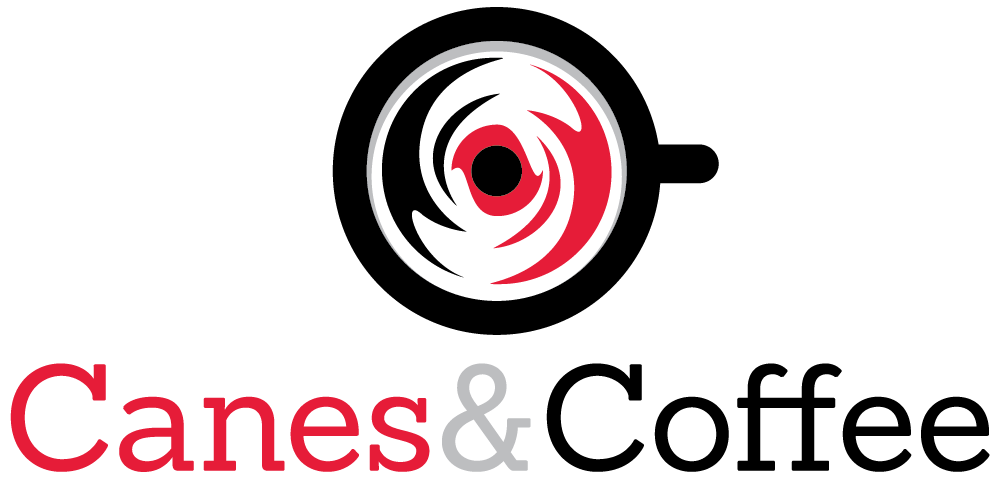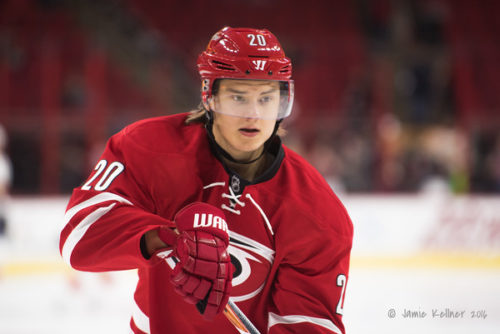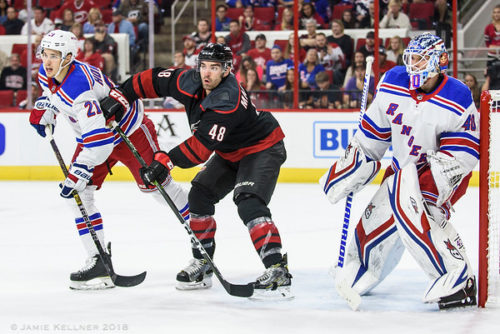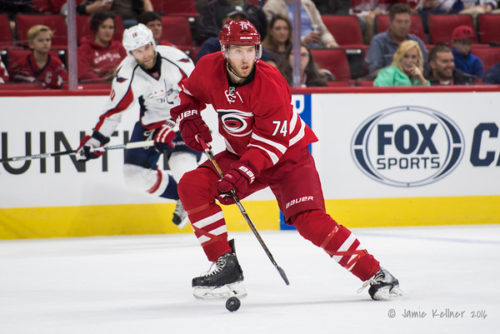There are many big ups and downs on a game by game basis during the Carolina Hurricanes schedule during a long NHL season, but the Monday after the NHL regular season ends has always been the hardest for me as a fan in non-playoff seasons. But now on day 2 of another long 5ish-month summer before we get preseason hockey in September it is time to push forward.
With the paint is barely dry on the 2016-17 season, it is time to start thinking about what went wrong and also what went right (because there was a reasonable mix). I will inevitably do a deeper dive (or many) on the 2016-17 season in the months ahead, but in thinking back on the just-completed season, here are my first impressions of General Manager Ron Francis’ work for 2016-17. The last part of that sentence is important, as an evaluation of Ron Francis’ work could vary significantly depending on whether one wants to look solely at 2016-17, only at the future or some mix of both.
Sticking to the Carolina Hurricanes mantra and plan
Evaluation: From day 1 of his tenure as general manager, Ron Francis has preached about his plan to patiently build from within and reach the playoffs again in a way that is sustainable. To his credit, he has backed up his words with action and been steadfast in not comprising the future to build quick fixes or band-aids for today.He entered the summer with 11 draft picks (4 more than the standard 7 with all of those picks being in the first 3 rounds). Many thought that he might spend some of those futures to bolster the 2016-17 lineup. He did do 1 deal for Teuvo Teravainen and Bryan Bickell and gave up a 2016 second round pick in addition to a third-rounder in 2017, but that was the extent of his swapping tomorrows for todays. In addition to hoarding and using his draft picks, Francis did not trade any prospects already in the organization. When you look at the Hurricanes additions relative to the average 7 (each team starts with 7 draft picks), Francis was a plus 3 for the summer.
Grade: In terms of building the roster for 2016-17, Francis easily earns an A. He deserves credit for voicing a plan and sticking to it.
What could Francis have done differently/better: In terms of steadfastly protecting the future, I think Francis did well. He added a roster player who also fits the future in 22-year old (at the time) Teuvo Teravainen and gave up very little to do so. I guess in an ideal world, Francis would have done 1 more deal to add a young roster forward, but that is asking a lot.
Building the Hurricanes blue line
Evaluation: With the ahead of schedule emergence of Jaccob Slavin and Brett Pesce in 2015-16, Francis entered the summer of 2016 with that position closest to his ultimate vision of stocking a lineup with good, young, internally-developed players. I think this position was actually the trickiest to sort out heading into the 2016-17 season and actually could be again heading into the 2017-18. With Hanifin, Pesce and Slavin just entering their sophomore seasons, Francis had to decide how much role/responsibility to give them versus how much to shield them a bit by pushing them down the depth chart a bit. He started the summer minus 1 veteran in John-Michael Liles who departed at the trade deadline. Francis made the simple choice to save his money for other things and mostly just roll with what he had on defense. He dabbled only at the bottom of the roster. He added Matt Tennyson who was presumed to be #5-#7 defenseman at the start of the summer and then used the waiver wire twice to add 2 similar depth players in Jakub Nakladal and Klas Dahlbeck.
I give Francis mixed reviews for his handling of the blue line. On the positive side of the ledger, Jaccob Slavin and Brett Pesce thrived when challenged with a bigger role and grew to become the team’s top defense pairing by early November. But below that there were problems. The Hainsey/Faulk pairing that was originally thought to be the team’s top pairing never really did put it together for more than a game here and there. It showed most on the road where opposing coaches feasted on them during the team’s road struggles especially in the first half to two-thirds of the season. Equally significantly, the third pairing became a revolving door around Noah Hanifin. Hanifin struggled and for the most part the player next to him did as well. Hanifin/Tennyson did seem to become a thing for awhile, but in total, the first three-fourths of Hanifin’s 2016-17 season was disjointed, offered minimal if any progress in his development and was arguably an early setback for him. The Ron Hainsey trade and Hanifin’s decent play in the top 4 in the last quarter of the season seems to have salvaged things, but I still would have hoped for a larger step forward for Hanifin in 2016-17. But as we have been reminded with Elias Lindholm, young players’ development is not always a straight line up. Fits, starts and even setbacks are not uncommon.
Grade: In total, I give Francis a B for building the blue line for the 2016-17 season. On the positive side, Francis avoided a big ‘oops’ by not spending a bunch of money on a veteran who did not work out. He also maximized the amount of ice time available for the young players. But at the same time, none of the 3 moves he made really worked. None of Nakladal, Tennyson or Dahlbeck really seized the third period role and excelled. The results were second and third pairings that never really did settle in until it was too late. With that comes the possibility that he could have done better. Though Francis’ bet on the current roster worked well with Slavin/Pesce, it just did not work otheriwbelow that top pairing when you look at the season in total.
What could Francis have done differently/better: Again, this was the trickiest position. With the youth emerging, by no means would it make sense for Francis to add a defenseman with significant term and cost. That said, hindsight being 20/20, I think the 2016-17 season would have benefited and maybe even had a significantly different ending if Francis had shopped 1 level up from the bargain bin in terms of short-term blue line help. Might another veteran have paired better with Faulk and solidified the second defense pairing? If so, might Ron Hainsey have been capable of providing veteran stability in a lesser role next to Noah Hanifin and created a domino effect that also stabilized the third pairing? We will never know. Important to note is that the Hurricanes defense corps are in good shape for the long-term future.
What say you Canes fans?
Do you take some solace in the disappointing non-playoff ending from the fact that Francis continues to steadfastly stick to his original plan and in the process build a deeper organization? Despite the complicated situation, do you agree that Francis could have done better in terms of building the blue line without hindering the youthful path forward?
Part 2 (hopefully tomorrow) will assess Francis’ work at the forward and goalie positions.
Go Canes!




I’d add one point to the Blue Line commentary …
We didn’t get to see any of the “next wave” of defensemen at the NHL level this season (like we did with Wallmark, Tolchinsky, and Zykov as forwards, which I’m sure you’ll mention tomorrow) to give us a sense of their development, which I view as disappointing.
Maybe CLT couldn’t afford to lose them or maybe they just aren’t that close to being ready. Whatever the reason, I think we all expect to see some combo of Carrick, Fleury, and McKeown in Raleigh next season, and even if giving them a taste of the NHL this year wouldn’t have been helpful for them, it certainly would have been helpful for us fans who are basically in the dark about their true level of play.
It is just my 2c, but I think not seeing Fleury at the NHL level was largely a function of Francis making a concerted effort to win at the AHL level. The team could have just made the best of it with Nedeljkovic/Altshuller when Leighton was injured. Instead, the team moved aggressively to play for 2016-17 in trading for McCollum, and the move has paid big dividends.
Nice analysis as always. I like how RF has handled the blue line. Pesce and Slavin got incredible experience in a first pairing role in a year that we were never likely to make the playoffs. This will pay benefits going forward as that question has been answered. Hainsey certainly could have been used to better effect as an on ice mentor for Hanifin. Hanifin has made the next step to me and can be a second pairing Dman next year with Faulk. I also like that Fleury spent the whole year in CLT and went through the playoff push. That will help him as well. Everything I read suggests he has made significant strides and will be here next season. We are the envy of the NHL on the back end and are set for many years to come. That’s worth the growing pains of this past season.
My grading would be B for the season A for sticking with plan. Agree with fabdou in having high expectations for Fleury. To dmiller’s point my guess is that Dmen aren’t as easily interchangeable or as easily assessed. The pairing seems to matter and takes more than a few games to really assess. Plus mistakes from the blue line are more costly. So until last three games Peters was focused on the games at hand and not future.
Would like to see Fleury start next year with Pesce.